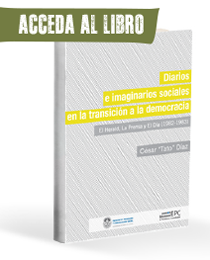Praise for Some, Reproaches for Other
Praise and Criticism in the Campeche Press: the Case of the Diario de Campeche (1926)
DOI:
https://doi.org/10.24215/24690457e045Keywords:
Campeche, press, post-revolution, governmentAbstract
The policy undertaken by the Campeche Agrarian Socialist Party, and the government administration of Ángel Castillo Lanz, coincided with the religious conflict in Mexico and the Cristero War of 1926. By then, the local press was open by showing their party affiliation in their reports, editorials, photographs and dissemination of those who held authority, as shown in the analysis of the Diario de Campeche, a print that praised the powerful and criticized the opponent.
Downloads
References
Abud Flores, J. (1992). Campeche: revolución y movimiento social (1911-1923). Ciudad de México, México: Instituto Nacional de Estudios Históricos de las Revoluciones de México (INEHRM), Universidad Autónoma de Campeche.
Abud Flores, J. (2012). Después de la Revolución. Los caciques y el Nuevo Estado. (Campeche 1923-1943). Ciudad de México, México: Universidad Autónoma Metropolitana.
Acuña Cepeda, M. (2014). De la Guerra Cristera a la paz en Colima (1929-1933). En L. Ramírez Hurtado, A. Pineda Soto y Luévano Díaz, A. (Coords.), Miradas sobre la prensa en el siglo XX (pp. 151-172). Aguascalientes, México: Universidad Autónoma de Aguascalientes.
Alvarado Mendoza, A. (1992). El portesgilismo en Tamaulipas. Estudio sobre la constitución de la autoridad pública en el México posrevolucionario. Ciudad de México, México: El Colegio de México.
Arrollo Vázquez, M. L. (2004). La prensa como fuente histórica: la percepción del modelo estadounidense. Trabajo presentado en las Actas del IV Simposio de Historia Actual. Logroño, España: Instituto de Estudios Riojanos, Gobierno de La Rioja.
Benjamin, T. (1996). Laboratorios del nuevo estado, 1920-1929. Reforma social, regional y experimentos en política de masas. En T. Benjamin y M. Wasserman (Coords.), Historia regional de la Revolución Mexicana. La provincia entre 1910-1929 (pp. 109-135) (pp. 109-135). Ciudad de México, México: Consejo Nacional para la Cultura y las Artes.
Civeira Taboada, M. (1986). Felipe Carrillo Puerto. Mártir del Proletariado Nacional. Ciudad de México, México: Comisión Editorial de la Liga de Economistas Revolucionarios de la República Mexicana.
Covo, J. (1993). La prensa en la historiografía mexicana: problemas y perspectivas. Historia Mexicana, XLII(3), 689-710.
Del Palacio Montiel, C. (1998). Historiografía de la prensa en México. Comunicación y Sociedad (33), 9-46.
Falcón, R. y García, R. (1986). La semilla en el surco. Adalberto Tejeda y el radicalismo en Veracruz. 1883-1960. Ciudad de México, México: El Colegio de México.
Garrido, L. (2003). El Partido de la Revolución Institucionalizada. La formación del nuevo estado en México (1928-1945). Ciudad de México, México: Siglo XXI.
Gómez Chacón, G. (Coord.) (2011). Tierra. El Magazine del Sureste. Mérida, México: Cámara de Diputados, LXI Legislatura. Compañía Editorial de la Península.
Martínez Assad, C. (2004) [1979]. El laboratorio de la Revolución. El Tabasco garridista. Ciudad de México, México: Siglo XXI.
May González, A. (2007). Conflicto religioso en Campeche, 1925-1929. Campeche, México: Programa de Acciones Culturales Multilingües y Comunitarias (PACMYC), Secretaría de Cultura, Gobierno del Estado de Campeche.
May González, A. (2014). Los primeros años de la posrevolución en Campeche (1921-1929). México: Instituto de Investigaciones Dr. José María Luis Mora.
May González, A. (2018). Rojo Amanecer. Órgano de difusión del Partido Socialista Agrario de Campeche. México: Instituto Campechano.
Meyer, J., Krauze, E. y Reyes, Ca. (1977). Historia de la Revolución Mexicana 1924-1928. Estado y sociedad con Calles. Ciudad de México, México: El Colegio de México.
Meyer, J. (1997). La cristiada. Ciudad de México, México: Siglo XXI.
Paoli Bolio, F. y Montalvo, E. (1980). El socialismo olvidado de Yucatán. Ciudad de México, México: Siglo XXI.
Pasos, G. (2010). Joaquín Mucel y el Constitucionalismo en Campeche. Campeche, México: Gobierno del Estado de Campeche.
Rodríguez Herrera, E. (2010). Campeche en la posrevolución. Campeche, México: Poder Legislativo del Estado de Campeche.
Rodríguez Herrera, E. y Vega Alí, R. (2011). Directorio histórico político y administrativo del Estado de Campeche. Campeche, México: Poder Legislativo del Estado de Campeche.
Savarino Roggero, F. (1997). Pueblos y nacionalismo. Del régimen oligárquico a la sociedad de masas en Yucatán, 1894-1925. Ciudad de México, México: Instituto Nacional de Estudios Históricos de la Revolución Mexicana.
Additional Files
Published
How to Cite
Issue
Section
License
Copyright (c) 2022 Ángel Omar May González, Fernando Jesús Cab Pérez

This work is licensed under a Creative Commons Attribution-NonCommercial-ShareAlike 4.0 International License.
The acceptance of an original by the journal implies the non-exclusive transfer of the patrimonial rights of the authors in favor of the publisher, who allows the reuse, after its edition (postprint), under a Creative Commons License Attribution-NonCommercial-ShareAlike 4.0 International.
According to these terms, the material can be shared (copy and redistribute in any medium or format) and adapted (remix, transform and create another work from the material), provided that a) the authorship and the original source of their publication (magazine and URL of the work) are cited, b) is not used for commercial purposes and c) the same terms of the license are maintained.
The assignment of non-exclusive rights implies that after postprint in IMPRONTAS de la historia y la comunicación authors may publish their work in any language, media and format; in that case, it is requested that they signal that the material was originally published by this journal.
Assignment also entails the authors’ authorization for the work to be collected by SEDICI, the institutional repository of the Universidad Nacional de La Plata, and for it to be indexed in the databases that the publisher thinks appropriate for enhancing the visibility of the published work and its authors.
In addition, the journal encourages authors to submit their works to other institutional and thematic repositories after their publication in IMPRONTAS de la historia y la comunicación, under the assumption that offering society unrestricted access to scientific and academic production contributes to a greater exchange in global knowledge.






.jpg)


.png)


.png)


















